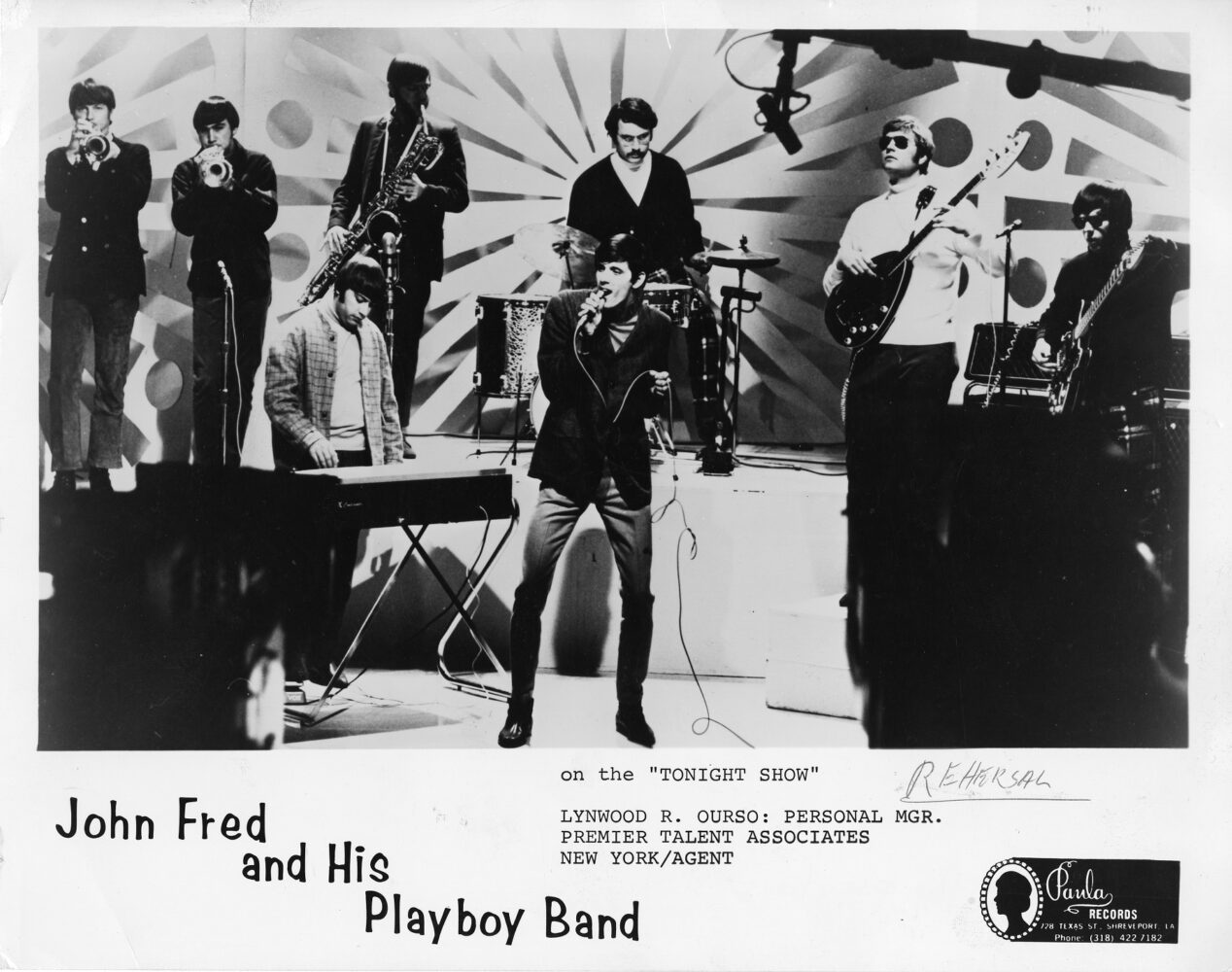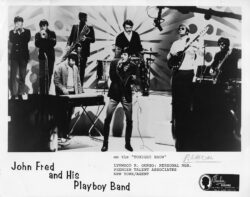John Fred and His Playboy Band
Radio staple “Judy in Disguise” has Baton Rouge roots
Published: June 1, 2020
Last Updated: June 1, 2023

East Baton Rouge Public Library
A publicity photo of John Fred and His Playboy Band taken at a rehearsal for their Tonight Show appearance.
Gourrier parlayed his passion into a nearly fifty-year career, the highlight of which came in 1968, when John Fred and His Playboy Band’s psychedelic pop-rock-soul pastiche, “Judy in Disguise (With Glasses),” reached Number 1 throughout the world. The song took Gourrier to The Tonight Show Starring Johnny Carson, Dick Clark’s American Bandstand, and Apple Records in London to meet the Beatles. A handful of Gourrier’s pre-“Judy in Disguise” singles — 1959’s “Shirley,” 1964’s “Boogie Children” and 1967’s “Up and Down” and “Agnes English” — achieved regional popularity in the United States. Making hits was always his goal. “And we did,” Gourrier said. “It was just our determination or our stupidity, one or the other.”
A six-foot-five-inch baseball and basketball star, Gourrier didn’t expect to turn pro in music. He made his performance debut at a party after the singer in a local band lost his voice. Gourrier’s impromptu renditions of Domino and Little Richard songs inspired an invitation to join the group. The Playboys—which would later become John Fred and the Playboys, then John Fred and His Playboy Band—impressed teen dance promotor and novice record producer S. J. Montalbano. “At first,” he said, “John Fred looked clumsy onstage because he was tall and skinny, but he had a real feel for music.” After Montalbano heard the Playboys perform “Shirley”—written by Gourrier and bandmate Tommy Bryan—he booked a recording session for the group’s seventeen-year-old front man at Cosimo Matassa’s studio in New Orleans. Musicians who’d played earlier that day for Domino also backed Gourrier. In March 1959, “Shirley” peaked at number 82 on Billboard’s Hot 100. Gourrier flew to New York City for an appearance on Alan Freed’s TV show, The Big Beat. Dick Clark invited him to appear on American Bandstand, but Gourrier politely declined, explaining that he had to go home to play in a basketball tournament.
Gourrier and guitarist Lynn Ourso met while they were students at Baton Rouge’s Catholic High School. In 1964, West Monroe singer and pharmacist Rocky Robin financed a recording session for John Fred and the Playboys at La Louisianne Recording Studio in Lafayette. The session ended with a portion of the band recording a driving medley of John Lee Hooker’s “Boogie Chillen,’ ” and Frankie Lee Sims’ “Walking with Frankie.” “Just me and Joe Miceli [drums] and John Fred and Don Chesson [bass],” Ourso said. “We put it down in one take and forgot about it.”
Having declared “Judy in Disguise” the worst record he’d ever heard, Bennett changed his tune following explosive listener response to the song. “This is a number 1 record!”
Shreveport record shop owner Stan Lewis leased “Boogie Children” for his new Jewel Records label. Gritty-voiced disc jockey Wolfman Jack, then broadcasting from a powerful “border-blaster” station in Mexico, loved the record. “He’d play it a half-dozen times, back to back, howling in the background,” Ourso said. Years later, when Gourrier met Elvis Presley backstage at the International Hotel in Las Vegas, Presley turned, pointed at Gourrier and said: “John Fred and the Playboys—‘Boogie Chillen.’ ”
In 1966, Lewis’s Paula Records released John Fred and His Playboys’ self-titled album debut. When Ourso left the band to attend Louisiana State University, saxophonist Andrew Bernard stepped in as Gourrier’s principal writing and producing partner. In 1967, Paula released their first collaboration, the fiery soul-pop romp “Up and Down.” “It was jumping up the R&B charts,” Gourrier recalled. “Well, the record company put a full-page ad in Billboard. When everybody saw I was white, they took the record off. After that I knew we couldn’t cut R&B anymore. We had to cut pop.”
The group’s follow-up single, “Agnes English,” blended the Playboys’ R&B-soul sound with British-invasion pop. It bubbled under Billboard’s Hot 100, opening doors for “Judy in Disguise (With Glasses).” “Judy” had detractors, however, including members of the Playboy Band and Buzz Bennett, music director at WTIX in New Orleans. Having declared “Judy in Disguise” the worst record he’d ever heard, Bennett changed his tune following explosive listener response to the song. “This is a number 1 record!” he told Ourso, who’d returned by then to be the band’s manager.
Gourrier and the Playboy Band’s next album, Permanently Stated, abandoned the catchy simplicity of “Judy in Disguise” in favor of the experimentation heard in 1967 albums by the Beatles, Moody Blues, and Rolling Stones. Featuring Bernard’s orchestral and choral arrangements, “it was a showcase for what we could write, what the band could play,” Bernard explained.
The ambitious Permanently Stated didn’t find an audience. “I got talked into a lot of that by band members,” Gourrier said in 1987. “It was my fault, because I let them get away with it.” Bernard subsequently left the Playboys after he attempted to replace Gourrier as leader.
Gourrier and Ourso reunited as creative partners to write and produce another album, 1970’s Love My Soul. Despite being released by major label Uni, it was unsuccessful, too. Gourrier subsequently produced recordings by other artists, including New Orleans’s Irma Thomas. He released two more solo albums, 1999’s I Miss Y’all and 2002’s Somebody’s Knockin’, a painstakingly crafted, years-in-production project featuring Gourrier songs co-written with his classic collaborators, Bernard, Ourso, and Bryan.
Beyond music, Gourrier loved coaching Catholic High School’s baseball team. In 1999, he began hosting his popular local radio show, The Roots of Rock and Roll. His stories about Roy Orbison, Clyde McPhatter, and other stars dazzled Leah Roberts Smith, the program’s board operator. “Did I ever tell you about the time I played pool with Elvis at Graceland?” he’d casually ask. Another time he mentioned: “John Lennon didn’t want much to do with me until he found out I knew Slim Harpo.”
Gourrier died on April 15, 2005, following a five-month, post-kidney-surgery hospital stay at Tulane University Hospital in New Orleans. Louisiana Governor Kathleen Blanco, his bandmates, and hundreds of friends and fans attended his memorial Mass in Baton Rouge. At the Mass’s conclusion, Gourrier’s first producer, S. J. Montalbano, said the parting words. “If there is a rock-and-roll heaven, he’s there jamming with Slim Harpo and Ernie K-Doe and Otis Redding and Jackie Wilson and Sam Cooke. Maybe one day we’ll look up in heaven and see John Fred in disguise with glasses.”
John Wirt is the author of the New Orleans music biography Huey “Piano” Smith and the Rocking Pneumonia Blues.

This article is funded in part by a grant from the New Orleans Jazz & Heritage Foundation.
